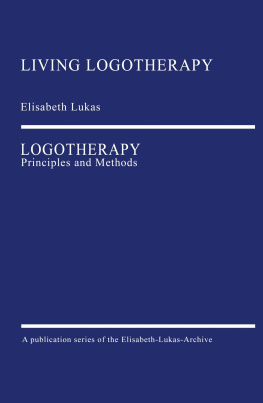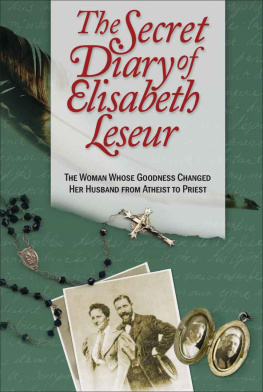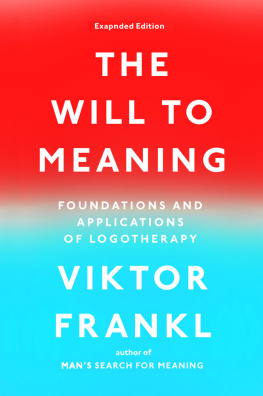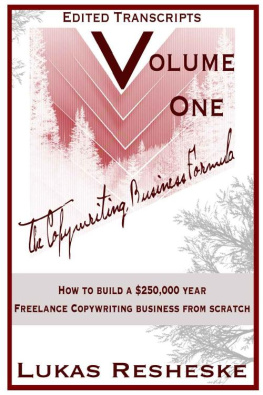Elisabeth Lukas - Living Logotherapy
Here you can read online Elisabeth Lukas - Living Logotherapy full text of the book (entire story) in english for free. Download pdf and epub, get meaning, cover and reviews about this ebook. year: 2020, publisher: Elisabeth-Lukas-Archive, genre: Religion. Description of the work, (preface) as well as reviews are available. Best literature library LitArk.com created for fans of good reading and offers a wide selection of genres:
Romance novel
Science fiction
Adventure
Detective
Science
History
Home and family
Prose
Art
Politics
Computer
Non-fiction
Religion
Business
Children
Humor
Choose a favorite category and find really read worthwhile books. Enjoy immersion in the world of imagination, feel the emotions of the characters or learn something new for yourself, make an fascinating discovery.
- Book:Living Logotherapy
- Author:
- Publisher:Elisabeth-Lukas-Archive
- Genre:
- Year:2020
- Rating:3 / 5
- Favourites:Add to favourites
- Your mark:
- 60
- 1
- 2
- 3
- 4
- 5
Living Logotherapy: summary, description and annotation
We offer to read an annotation, description, summary or preface (depends on what the author of the book "Living Logotherapy" wrote himself). If you haven't found the necessary information about the book — write in the comments, we will try to find it.
Living Logotherapy — read online for free the complete book (whole text) full work
Below is the text of the book, divided by pages. System saving the place of the last page read, allows you to conveniently read the book "Living Logotherapy" online for free, without having to search again every time where you left off. Put a bookmark, and you can go to the page where you finished reading at any time.
Font size:
Interval:
Bookmark:

Living Logotherapy
Published by

www.elisabeth-lukas-archiv.de
2020 Elisabeth-Lukas-Archiv gGmbH
Dr. Heidi Schnfeld
Nrnberger Strae 103a
D-96050 Bamberg
info@elisabeth-lukas-archiv.de
This English edition published with the kind permission of Profil Verlag. Originally published in German as Lehrbuch der Logotherapie, Menschenbild und Methoden 2014 Profil Verlag GmbH Mnchen, Wien
Elisabeth Lukas
LOGOTHERAPY
Principles and Methods
Translated from the German by:
Dr. David Nolland, Oxford
Edited by:
Dr. Heidi Schnfeld, Bamberg, and Dr. David Nolland, Oxford
Cover design, typesetting and layout:
Bernhard Keller, Kln
Print and distribution: tredition GmbH, Hamburg
ISBN 978-3-00-066678-0 (paperback)
ISBN 978-3-00-066679-7 (eBook)
Contents
Foreword
Translators Note
Logotherapys Concept of Man
Classification of Logotherapy
The Concept of Dimensional Ontology
The Dialectic of Fate and Freedom
Conscience, the Organ of Meaning
The Dialectic of Vulnerability and Intactness
The Dialectic of Pleasure Orientation and
Meaning Orientation
An Intermediary Case Study
Two and three dimensional interpretations
The Dialectic of Character and Personality
Self-knowledge and Dealing with Oneself
The Logotherapeutic Form of Conversation
Keywords as a Guarantee Against the Imposition of Values
The Problem of Ambivalence: the Torn Human Being
The Problem of Non-acceptance: People Who are Frozen
by Protest
The Problem of Ignorance: the Person Walled-in
by Indifference
Reflections on a Rhetoric of Love
The Methods of Logotherapy
The Categories of Neurosis According to Viktor E. Frankl
The Origin of Anxiety Neuroses
Curing Anxiety Neuroses
Keeping the Compulsive Neurotic Character in Check
A Bit of Unkindness: Hysteria
Rescue by Renunciation
A Multidimensional Concept for Dealing with Addiction
Eating Disorders a Problem Complex with Two Roots
Preventing Iatrogenic Damage
Supporting Patients with Somatic / Endogenous Illness
Dealing with the Blows of Fate
Noogenic Neuroses and Depressions
Ways Out of the Existential Vacuum
How Sleeping Disorders and Sexual Disorders are Created
A Recipe for Avoiding Egocentricity
Prevention and Aftercare
The Value of Life
The Pathogenesis of Mental Disorders
Further Developments in Logotherapy
Being Able to Decide Well
Principles of Meaning-Centred Family Therapy
Perceiving Oneself in a Completely Different Way
The Author
Foreword for the Series Living Logotherapy
In our time, people usually have enough to live on. What they often lack, however, is something to live for. This is how Viktor E. Frankl, the Viennese psychiatrist and founder of logotherapy, summarised a problem that is just as relevant today as ever. Elisabeth Lukas, a clinical psychologist and psychotherapist, has an international reputation as Frankls most important student. In her many books, she illustrates how logotherapy provides help in cases of mental illness, enriches the everyday life of healthy people and inspires us all to lead a meaningful, fulfilling life. Her books illustrate how humane, authentic and up-to-date a living logotherapy can be. The main objective of this new series is to make her books, which have enjoyed lasting success in the German-speaking world, more accessible to speakers of English.
Many people have worked hard to make it possible for the Elisabeth Lukas Archive to publish this new series. Particular thanks are due to our translator Dr. David Nolland, who has produced a fluid text that remains very close to the original. He has excellent knowledge in the field of logotherapy and supervises this series in all matters relating to the English-speaking market. Thanks are also due to Prof. Dr. Alexander Batthyny, who supported us from the beginning and will accompany this series as a guide. The formatting and layout is due to Bernhard Keller, and the beautiful presentation of the books is wholly attributable to his expertise.
The first book in this series was a collaborative project combining discussions of the theory of logotherapy by Lukas with numerous case studies by Schnfeld. The present book, the second in the series, is a textbook by Elisabeth Lukas on the fundamental concepts of logotherapy and their applications. This book has been reprinted in German many times, but there has not, until now, been a satisfactory translation available in English.
Thanks to Dr. Kagelmann of Profil Verlag, the holder of the rights for the German version of the books, for generously giving his permission for an English language version.
The third book, which will appear shortly, is a further collaboration between Lukas and Schnfeld, combining case studies with discussions of how these cases illustrate the practical application of logotherapeutic methods.
All that remains is to wish all of these books on the practical application of logotherapy success in the English-speaking world. May it give readers a glimpse into the vitality and relevance of these lifechanging therapeutic methods!
Dr. Heidi Schnfeld
Director of the Elisabeth-Lukas-Archive
Translators Note
Logotherapy is notoriously tricky to translate, as indicated by Frankls dissatisfaction with the translations of his own works. In developing his ideas, Frankl made use of nuances of language: metaphor, wordplay, and poetry, and it is not always possible to render these into another language. What is important is to make sure that Frankls intentions are respected, that his underlying respect for the human spirit in all its responsibility and freedom is kept in focus.
Elisabeth Lukas is a student of Frankl who followed very closely in his footsteps, and this classic work illustrates her achievements in developing the practical applications of Frankls logotherapeutic methods. To do justice to these methods, and provide a satisfactory reference work for an English-speaking world, we have to be careful that the nuances do not become misleading. To stay on track, we simply need to recall that meaning is always there to be found, and that we have, inalienably, within ourselves, everything we need to find it.
A note on the many Frankl quotations in this book. Most of these have been cited from German originals, and in these cases the translations are all mine. In many cases there is no English translation available, and even where there is, we often felt that a new translation was better suited to the needs of Lukas text.
Dr. David Nolland
LOGOTHERAPYS
CONCEPT OF MAN
Classification of Logotherapy
Logotherapy was founded by the Viennese psychiatrist and neurologist Viktor E. Frankl (1905-1997). It can be categorized amongst the many therapeutic approaches existing today by noting to two main points of view:
According to W. Soucek, logotherapy is the Third Viennese School of Psychotherapy, where Sigmund Freuds psychoanalysis is the First Viennese School of Psychotherapy and Alfred Adlers Individual Psychology is the Second Viennese School of Psychotherapy. There is a simple rule of thumb to help us remember the emphases of these three approaches: Sigmund Freud focused on the will to pleasure, Alfred Adler on the will to power, and Viktor E. Frankl on the will to meaning. Naturally these are only simplified descriptions, which cannot claim to do full justice to the corresponding schools of psychotherapy. They merely characterise typical areas of research. Freuds comprehensive theories focus on human drives in particular the gratification of the sexual drive which, if suppressed, become a source of psychic disorder. Adler examined the relationship of the individual to the social environment and derived the theory that deepseated feelings of inferiority lead to compensatory striving for power. Frankl ultimately saw human beings as entities who want to shape life in a meaningful way, and who can become psychically ill when their
Next pageFont size:
Interval:
Bookmark:
Similar books «Living Logotherapy»
Look at similar books to Living Logotherapy. We have selected literature similar in name and meaning in the hope of providing readers with more options to find new, interesting, not yet read works.
Discussion, reviews of the book Living Logotherapy and just readers' own opinions. Leave your comments, write what you think about the work, its meaning or the main characters. Specify what exactly you liked and what you didn't like, and why you think so.











